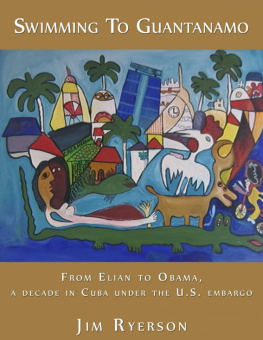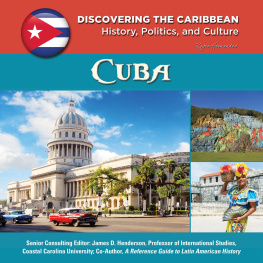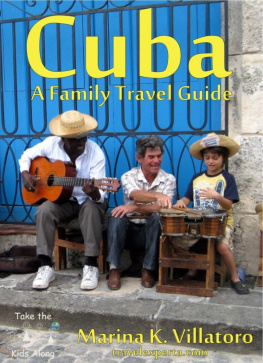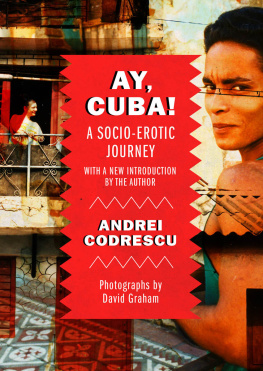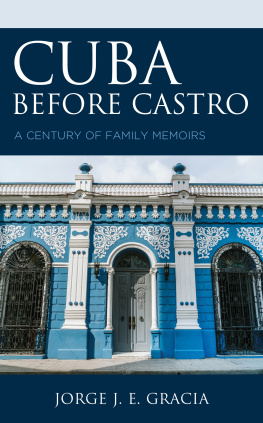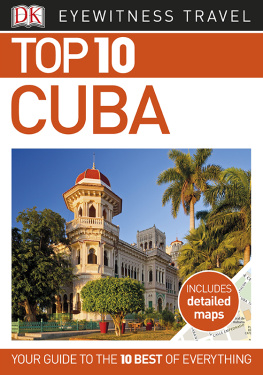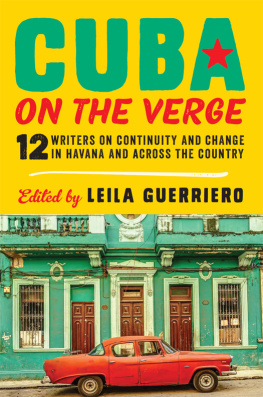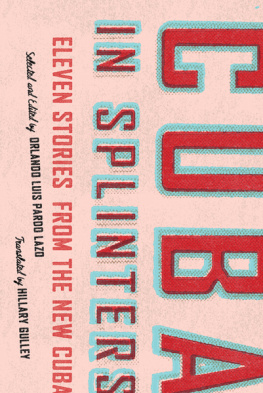Swimming To Guantanamo
From Elian to Obama
A Decade in Cuba under the U.S. Embargo
By Jim Ryerson
copyright 2014 Jim Ryerson
Smashwords Edition
http://www.cubaconnections.org
Cover art courtesy of Jose Fuster
ALL RIGHTS RESERVED. This book contains materialprotected under International and Federal Copyright Laws andTreaties. Any unauthorized reprint or use of this material isprohibited. No part of this book may be reproduced or transmittedin any form or by any means, electronic or mechanical, includingphotocopying, recording, or by any information storage andretrieval system without express written permission from theauthor/publisher.
Smashwords Edition, License Notes
This ebook is licensed for your personalenjoyment only. This ebook may not be re-sold or given away toother people. If you would like to share this book with anotherperson, please purchase an additional copy for each recipient. Ifyoure reading this book and didnot purchase it, or it was notpurchased for your use only, then please return to your favoriteebook retailer and purchase your own copy.
Thank you for respecting the hard work ofthis author.
TABLE OF CONTENTS
PREFACE
Under a U.S. trade embargo imposed half acentury ago, U.S. citizens are barred from traveling to Cuba. As ajournalist, I began visiting Cuba in 1998 and during my more than35 visits Ive met hundreds of Cubans who have graciously sharedtheir lives, music, food, and culture and created my passion totell their stories. In writing these stories, Ive tried tocounteract some of the false impressions about Cuba and its people,and to present an objective look at this fascinating neighboringcountry.
Back then Cuba was coming out of what was knownas the special period when the Soviet Union fell and Cuba wasleft to go it alone on the world stage after four decades ofalliance with the Russians. When the Russians left, they took thefive million dollars a day they had been giving the Cubans inforeign aid. Pundits in Washington and Miami declared that this wasthe end of Castros revolutionary government. As with most who havepredicted the end of the Cuban revolution, they were wrong.
While taking on the United States alone, theCubans have managed somehow to keep going. It is a life which isdifficult to grasp for those growing up off the island, especiallyhere in the United States where news about Cuba is mostly writtenin Miami by people who lie about Cuba for a living.
Many things have changed since that first visitand, while on the surface Cuba seems to be stuck in a time warpsomewhere in the 1950s, it is so much more than the old Americancars, the Spanish colonial architecture of Old Havana or the wavescrashing over the Malecn. Today Cubans have much more freedom,Communism is all but gone and President Raul Castro has thrown openthe doors to a Socialist-based free enterprise that is catching onacross the country. The Cuban people are opening their ownbusinesses, and keeping what they make (after taxes of course, justlike in the USA).
What will come of this remains to be seen but,given the industriousness of the Cubans, they will make it work andI will continue to tell their stories.
Some names have been changed to protect theprivacy of those who had talked to an American reporter, but theirstories are as they happened.
INTRODUCTION: ELIAN AND ME
As I sat down to a lobster dinner at arestaurant in Havana on Thanksgiving Day 1999 and watched the wavesgrow, I knew there was a storm brewing in the Straits of Florida.What I didn't know was that there was a little boy out theresomewhere over the horizon, that his name was Elian Gonzalez, andsoon the whole world would know about him.
I didnt know much about Cuba at the time,having made just one other trip to the island. But I did know aboutjournalism which was my profession and the only reason I, as anAmerican, was even allowed to be in the country. Americans wereprohibited from coming by what seemed an outdated cold-war relic ofa law. But as Elians story began to be told, what was being saidin Miami did not match the reality that I saw in Cuba, and the lieof our foreign policy toward this country became a lot clearer.There was no one to defend Cuba against a roaring voice of Floridabased Cuban exiles that put down anything and everything comingfrom the island.
We had been well practiced in lying about Cubafor more than a century. William Randolph Hearst and the rest ofthe expansionist press of the late 19th century drummed up theheadlines which dragged us into the 3rd War of Cuban Independence,which we renamed the Spanish American War. The Cubans had theSpanish on the run, but the might of our Navy and the invasionforce made famous by Teddy Roosevelt and the Rough Riders, pushedthe Spanish out and allowed the Americans in, apparently forever.The base at Guantanamo is on Cuban soil, and their government hasasked us to leave for more than half a century.
But in recent years the propaganda seemed toreach its high point with Elian. The company line in Miami was thathe could not be returned to Cuba because he would become, as allCuban children allegedly were property of the state. SinceCuban-Americans were saying this, and no one else was sayinganything different, it was easy to make the rest of America buyinto that story. But, because I had been there, I knew the storywas a lie. And now that Ive been several dozen times, I discoveredthat a birthday party may say more about their everyday lives thanthe Communist party, a lesson learned in the tenements of CentralHavana.
You can make fast friends in Cuba, especially inHavana. It can seem like lots of people want to meet and interactwith foreigners. However, most of those who initiate contact withyou are probably hustling something; a room for rent, tour guideservices, cigars, a restaurant, or sexual companionship.
As a six foot, two hundred pound blond, I do notblend in well in Cuba. Foreigner is figuratively stamped across myforehead, and every hustler of every ilk in Havana and Santiago hashit me up in the past dozen years of visits to the island. It is away for them to make money and if you let them (rather, if youdont stop them) they will stay with you your entire trip, andremain in contact with you after you go home. Some will evenattempt to come home with you, as marrying a foreigner is the quickticket off the island that many of these hustlers want.
Those who only experience this Cuba, or who flydirectly to the beach at Veradero and ignore the cities, aremissing a great deal and certainly the flavor of the island. Inmore than 30 trips Ive come to make friends and have visited withCubans, and their children, in their homes. One friend had invitedme to come over for a birthday party for his niece.
My friends family runs a restaurant (known as aPaladar) in Central Havana. Although most things in Cuba are staterun, the government allowed some independent businesses to start upin the mid-90s after the Soviets had taken their fallen communismand gone home. They also ended the five million dollar a daysubsidy that they had been pumping into the economy. So to bring insome needed currency, the Cubans allowed for a bit of capitalismlike these small independent restaurants to exist.
Of all the barrios of the capitol, CentralHavana is something of a stepchild. Ignored by tourists wanting todive into the five hundred year history of Havana Vieja (oldHavana), or the upscale suburbs of Vedado and Miramar, Centro isoverlooked and underappreciated. The street where my friend had hisrestaurant was typical. The block was lined on both sides byapartment buildings well over 100 years old.
They rose five, six, seven, eight stories high,and people seemed to be flowing in and out of them all day andnight. At the corner, what I presumed to be a toy store filled thefirst floor, with an assortment of dolls in various coloreddresses. I was wrong in my assessment of the business. It turnedout that it was a Santeria shop, where devotees of that Afro-Cubanreligion could buy the things they needed for their ceremonies. Thedolls werent toys, but saints in their religion.
Next page
